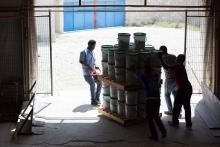
The U.S. Agency for International Development (USAID) implements different types of projects and activities worldwide that may produce waste, including healthcare waste (HCW). The proper treatment and/or disposal of HCW is imperative in USAID projects to avoid adverse environmental, social, and health impacts. This course provides USAID staff and Implementing Partners (IPs) that manage HCW generated from USAID-funded activities with an introduction to HCW Management (HCWM) best practices. The training applies to all types of activities where HCWM and basic infection prevention and control are required.
- Revised terminology and document references, particularly regarding GH Environmental Mitigation and Monitoring Plans and Reports (EMMP/Rs).
- Updated roles and responsibilities for various stakeholders involved in HCWM projects.
- Clarified information on waste classification and management procedures.
- Refined content on environmental and social impacts of Healthcare Waste (HCW).
Objective
Upon completion of this course, participants will be able to do the following:
- Define applicable legal and policy guidelines governing HCWM activities.
- Compare the roles and responsibilities involved in the HCWM process.
- Categorize the types of hazardous and non-hazardous wastes resulting from USAID-funded activities.
- Identify the appropriate methods to handle, collect, and store HCW.
- Select the appropriate types of HCW treatment and disposal options.
- Deduce the social and environmental impacts and risks associated with HCWM.
- Recognize the documentation necessary for HCWM planning and the importance of early planning and budgeting.
Time
- 2 hours
Published/Updated
- Monday, September 23, 2024
Course Authors:
Dennis Durbin, GH BEO
ICF
Kestrel Tellevate, LLC
Course Managers:
- Emily Watt, ewatt@goktl.com
- Thomas Mon, Tmon@usaid.gov
